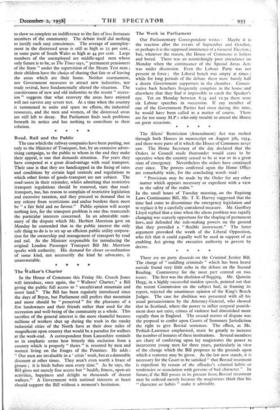Road, Rail and the Public The case which the 'railway
companies have been putting, not only to the Minister of Transport, but, by an extensive- adver- tising campaign, to the public to whom in the end they make their appeal, is 'one that demands attention. For years they have competed at a great disadvantage with road transport. Their case is that they are handicapped in the fixing of rates 'and conditions by certain legal controls and regulations to which other forms of goods-transport are not subject. The road-userKin their rejoinder, whilst admitting that restrictive transport regulations should be removed, state that road- transport, too, has reason to complain of restrictive legislation and excessive taxation, and they proceed to demand that in any release from restrictions and undue burdens there must be " a fail field and no favour." Public opinion will accept nothing less*, for the transport problem is one that transcends the particular- interests concerned. In an admirable sum= mary of the dispute which Mr. Herbert Morrison gave on Monday he contended that in the public interest the only safe thing to do is to set up an efficient public utility corpora- tion for the ownership and management of transport by road and rail. As the Minister responsible for introducing the original Linidon Passenger Transport Bill Mr. Morrison speaks with authority. His demand for closer co-ordination Of some kind, not necessarily the kind he advocates, is unanswerable.


























































 Previous page
Previous page